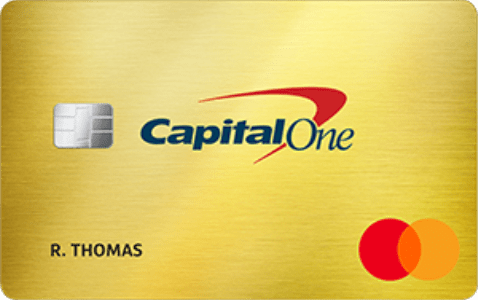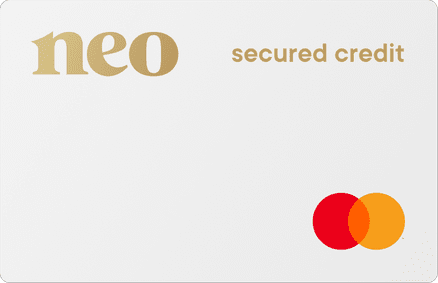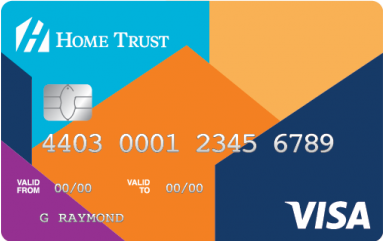If you want to improve, rebuild or re-establish your credit score, the Home Trust Secured Visa Card may be the right fit for you.
The Home Trust Secured Visa comes in two options: a $0 annual fee secured card with a great 19.99% APR or; Opt for $59 annual fee and pay 14.90% APR interest instead. The choice is yours.
This card’s credit limit scales with your security deposit, and it offers monthly reporting to both major credit bureaus in Canada. The Home Trust Secured Visa credit card offers cardholders flexibility, including a grace period after each monthly statement that doesn’t charge any extra interest on your bill for 21 days.
On top of the low-barrier of entry and useful features for rebuilding credit, Home Trust Secured Visa cardholders can also benefit from having a Visa in their wallets. Access to millions of ATMs and shops around the world, easy online banking and purchase protection are convenient perks that Visa customers will consider valuable.
The ‘Secured’ portion of the card means that the credit limit attainable is flexible, ranging from $500 to $10,000, depending on how much is put down initially as a security deposit.
Who is the Home Trust Secured Visa card for?
With its easy approval, the Home Trust Secured Visa is good for almost anyone looking for a secured card instead of an unsecured card. But it’s especially useful if you’re looking to establish credit or rebuild poor credit.
Pros and cons of the Home Trust Secured Visa Card
Pros
-
Reports to credit bureaus every month, helping to quickly build your credit rating.
-
Requires a $500 minimum deposit, with the credit limit scaling on a 1:1 basis all the way up to $10,000.
-
High approval rate
-
Monthly credit reporting to major credit agencies every month, expediting the credit repair or improvement process
-
Low foreign transaction fee
-
Cardholders get a 21-day no-interest grace period
-
Low monthly minimum payment options; pay either the greater of $10 or 3% of the monthly balance.
Cons
-
Standard interest rate although, if you opt for the annual fee version of the card, it comes down
-
No rewards or perks
-
Charges a monthly inactivity fee of $12 if the card is not used for a period of 12 months.
-
Despite a high approval rate, there are still chances of being denied based on deal-breaking factors
-
No welcome bonus offer as it is designed for credit building
How to earn points
The Home Trust Secured Visa Card doesn’t offer a points reward system or cash back rewards. Key benefits
- Credit building: Reports to credit bureaus each month which helps you build your credit.
- Flexible credit limits: Based on the security deposit, you can choose your own credit limit between $500 and $10,000.
- High approval rate: Whether you have no credit history, poor credit, or have experienced bankruptcy, you’re likely to be approved.
Insurance coverage
- The card does not offer insurance coverage.
Extra benefits
- Visa acceptance: The card offers the global access, convenience and security of a Visa card.
- Visa Zero Liability: Provides protection against unauthorized transactions.
- Purchase Protection: 90 days
How the Home Trust Secured Visa compares
Capital One Guaranteed Secured Mastercard

2.6
Poor
Suggested credit scoreto receive the latest news, tips and offers by email
Pros
-
Guaranteed approval for those with weak credit
-
Helps build or repair credit history with responsible use
-
Low annual fee
-
Purchase and travel benefits for available for those who qualify for the unsecured card version
Cons
-
High interest rate
-
Limited extra features for secured cards
-
Security funds are required for the secured version
Eligibility
Poor
Recommended Credit Score
$0
Required Annual Personal Income
$0
Required Annual Household Income
Recommended Credit Score
Poor
Required Annual Personal Income
$0
Required Annual Household Income
$0
21.9%
Purchase APR
21.9%
Balance Transfer Rate
21.9%
Cash Advance APR
$59
Annual Fee
Purchase APR
21.9%
Balance Transfer Rate
21.9%
Cash Advance APR
21.9%
Annual Fee
$59
Pros
-
Guaranteed approval for those with weak credit
-
Helps build or repair credit history with responsible use
-
Low annual fee
-
Purchase and travel benefits for available for those who qualify for the unsecured card version
Cons
-
High interest rate
-
Limited extra features for secured cards
-
Security funds are required for the secured version
Eligibility
Poor
Recommended Credit Score
$0
Required Annual Personal Income
$0
Required Annual Household Income
Recommended Credit Score
Poor
Required Annual Personal Income
$0
Required Annual Household Income
$0
21.9%
Purchase APR
21.9%
Balance Transfer Rate
21.9%
Cash Advance APR
$59
Annual Fee
Purchase APR
21.9%
Balance Transfer Rate
21.9%
Cash Advance APR
21.9%
Annual Fee
$59
Home Trust Secured Visa Card vs. the Capital One® Guaranteed Secured Mastercard
The Home Trust Secured Visa and Capital One® Guaranteed Secured Mastercard cater to individuals aiming to build or rebuild their credit, yet they differ in several aspects.
The Home Trust Secured Visa stands out with its no annual fee policy, flexible credit limit (starting as low as $500). The Capital On®e Guaranteed Secured MasterCard imposes an annual fee of $59 but offers a lower initial security deposit as low as $75, which is relatively low compared to other secured cards. The interest rate is slightly lower at 21.9% on purchases, cash advances, and balance transfers.
Neo Secured Mastercard

2.7
Poor
Suggested credit scoreto receive the latest news, tips and offers by email
Pros
-
Low minimum security deposit
-
Cash back rewards on purchases
-
No hard credit check
Cons
-
High APR range
-
$5 monthly fee
-
Best cash back offer requires high balance
Eligibility
Poor
Recommended Credit Score
$0
Required Annual Personal Income
$0
Required Annual Household Income
Recommended Credit Score
Poor
Required Annual Personal Income
$0
Required Annual Household Income
$0
Up to 4%
Earn up to 4% on gas and groceries
up to 1%
Earn up to 1% on everything else
$680
Earn up to $680 in annual cashback
Earn up to 4% on gas and groceries
Up to 4%
Earn up to 1% on everything else
up to 1%
Earn up to $680 in annual cashback
$680
19.99% - 29.99%
Variable APR For Quebec 19.99%-24.99%
22.99% - 31.99%
Cash Advance APR For Quebec 22.99%-25.99%
$59
Annual Fee $5 monthly fee
Variable APR
19.99% - 29.99%
Cash Advance APR
22.99% - 31.99%
Annual Fee
$59
Pros
-
Low minimum security deposit
-
Cash back rewards on purchases
-
No hard credit check
Cons
-
High APR range
-
$5 monthly fee
-
Best cash back offer requires high balance
Eligibility
Poor
Recommended Credit Score
$0
Required Annual Personal Income
$0
Required Annual Household Income
Recommended Credit Score
Poor
Required Annual Personal Income
$0
Required Annual Household Income
$0
Up to 4%
Earn up to 4% on gas and groceries
up to 1%
Earn up to 1% on everything else
$680
Earn up to $680 in annual cashback
Earn up to 4% on gas and groceries
Up to 4%
Earn up to 1% on everything else
up to 1%
Earn up to $680 in annual cashback
$680
19.99% - 29.99%
Variable APR For Quebec 19.99%-24.99%
22.99% - 31.99%
Cash Advance APR For Quebec 22.99%-25.99%
$59
Annual Fee $5 monthly fee
Variable APR
19.99% - 29.99%
Cash Advance APR
22.99% - 31.99%
Annual Fee
$59
Home Trust Secured Visa Card vs. the Secured Neo Mastercard
You can opt to pay $5 monthly fee to get the Secured Neo Mastercard or you can pay $59 to give yourself lower monthly interest rates with Home Trust. They both have high acceptance criteria and offer scaling credit, but the minimum deposit with Neo is $50, as opposed to Home Trust which is $500. This makes it easier to start rebuilding your credit.
- Neo Credit and Neo Secured Credit cards are issued by Neo Financial™ pursuant to license by Mastercard International Incorporated.
Home Trust Secured Visa reviews: What users have to say
Reddit users on the r/PersonalFinanceCanada subreddit have shared opinions and experiences regarding the Home Trust Secured Visa Card, though the general feeling is that it’s a viable option to build or rebuild credit. Users complimented it on its no annual fee in this thread and appreciate that it reports to both credit bureaus to rebuild credit.
However, there are some customer service concerns. Users discuss less-than-ideal experiences, and other users have experienced delays or issues with the application and approval process.
Know that individual experiences can vary, but in general, Home Trust company reviews are positive.
Who’s the card for?
Those with excellent or even good credit would be better served by another card that offers lucrative rewards or cash back and should likely consider the Home Trust Preferred Visa instead. But by approving virtually all applicants, the Home Trust Secured Visa Card provides a credit-building opportunity to those who are in greatest need of improving their score.
FAQs

Scott Birke is a finance editor at Money.ca.
Compare other secured credit cards
Compare other secured credit cards
Compare other no annual fee credit cards
Compare other no annual fee credit cards
Compare other Visa credit cards
Compare other Visa credit cards
Disclaimer
The content provided on Money.ca is information to help users become financially literate. It is neither tax nor legal advice, is not intended to be relied upon as a forecast, research or investment advice, and is not a recommendation, offer or solicitation to buy or sell any securities or to adopt any investment strategy. Tax, investment and all other decisions should be made, as appropriate, only with guidance from a qualified professional. We make no representation or warranty of any kind, either express or implied, with respect to the data provided, the timeliness thereof, the results to be obtained by the use thereof or any other matter. Advertisers are not responsible for the content of this site, including any editorials or reviews that may appear on this site. For complete and current information on any advertiser product, please visit their website.






